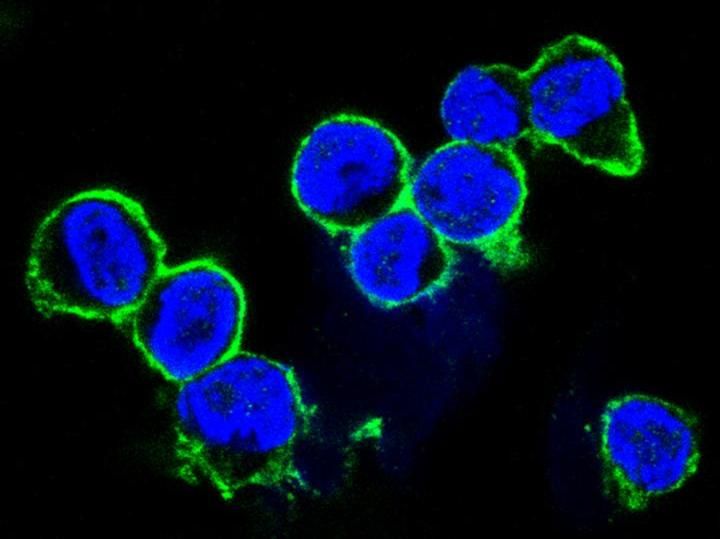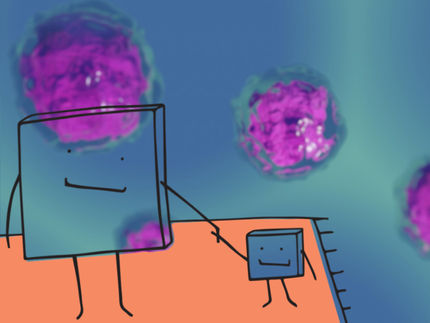Disrupting cell's supply chain freezes cancer virus
Advertisement
When the cancer-causing Epstein-Barr virus moves into a B-cell of the human immune system, it tricks the cell into rapidly making more copies of itself, each of which will carry the virus.

Green fluorescent dyes in this microscopic view mark the presence of the glucose transporter, GLUT1, on the surface of lymphoblastoid cells which go on to form the lymphomas caused by Epstein-Barr virus. GLUT1 appears here because these cells have been taken over by the virus, which increases demand for more glucose to continue its infectious path.
Amy Hafez, Duke University
To satisfy a sudden increase in demand for more building parts, rapidly dividing host cells will chew up their insides to free up more amino acids, fats and nucleotides.
But if supplies of these materials run low, the cell will enter a suspended state called senescence and cell division will stop, freezing the advance of the virus, according to new findings from a Duke University research team that appear in Proceedings of the National Academy of Sciences.
The first virus shown to cause cancer in humans, Epstein-Barr (EBV) has long been a puzzle to researchers. It is found in more than 90 percent of adults worldwide, yet only a small proportion of people ever succumb to the lymphomas and other cancers the virus can cause.
A big part of the answer is the body's immune system, said lead study author Micah Luftig, an associate professor of molecular genetics and microbiology in the Duke School of Medicine, and deputy director of Duke's Center for Virology. For the most part, a healthy immune system stops Epstein-Barr virus from making much headway, Luftig said. In fact, many of the cancers linked to EBV are found mostly in immune-compromised patients whose ability to fight it off has been weakened.
But another answer may be this newly discovered senescence trigger, Luftig added.
Using a new technology that allows researchers to see what state of maturation individual cells are in, the team could see variations in the activity of viral genes from one cell to the next.
They found that the EBV is able to switch the cell's fuel source to keep the cells proliferating even as they chew up their internal parts to create more building supplies.
So the team tried making B-cells sense they were starving by using the drug Rapamycin. The strategy worked well enough that they could turn the senescence of EBV-infected cells on and off.
The next phase of this research will involve colleagues at the University of North Carolina at Chapel Hill who have developed mice with a human immune system. These mice will be infected with EBV and then researchers will test various drugs to see if the senescence response can be triggered and controlled, Luftig said.






















































